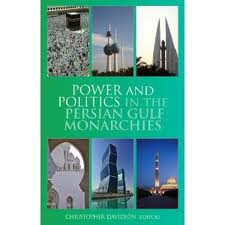Power and Politics in the Persian Gulf Monarchies
New York: Columbia University Press, 2011
“This will no doubt make a very good and useful textbook for undergraduate students as it is highly informative on both past and current issues. The chapters follow a similar framework, which makes the whole book particularly coherent and helps the reader to compare the six Gulf monarchies.” — Laurence Louer, author Transnational Shia Politics (Columbia UP)
“Lay aside any reservations about edited works. Power and Politics in the Persian Gulf Monarchies provides a coherent, concise and remarkably up to date account of how the six states of the Gulf Cooperation Council got to where they are now and of the challenges facing them.” — Sir Harold Walker, former Ambassador to Bahrain, the United Arab Emirates and Iraq
“Power and Politics in the Persian Gulf Monarchies is a superb addition to the existing literature on an area long neglected by scholars of the Middle East. By providing comprehensive, in-depth analyses of the domestic politics of the GCC states, the volume highlights the travails and complexities of their political development and the inevitability of the political changes to come. It is essential reading for anyone interested in the serious study of the Middle East and the Persian Gulf.” — Mehran Kamrava, Director of the Center for International and Regional Studies, Georgetown University-Qatar
“This is the best book available on the Gulf Cooperation Council countries. Concise, well written, yet rich in detail and informed by relevant theorising, it covers the history, politics, personalities, and economies of these monarchies now challenged by the Arab Spring. Their futures, according to these authors, are unlikely to be as rosy as their pasts.” — Robert Springborg, Department of National Security Affairs, Naval Postgraduate School
“This unique, timely volume represents the single best overview of the modern histories and contemporary challenges facing the six nations of the Gulf Cooperation Council. The authors provide nuanced accounts of post-oil economy diversification, shared security concerns, and religious tensions facing the Gulf, and how the “Arab spring” may eventually lead to political reform.” — Marcia C. Inhorn, Professor of Anthropology and International Affairs, Yale University
“The perfect briefing on the history, political dynamics and personalities, foreign policy, and economy of the Arab Gulf states: a lucid summing up of themes and trends in these four areas; country chapters pursuing them systematically and accessibly; a wealth of hard-to-come-by information; and incisive analysis representing the most recent research. Just as useful to novices as to the initiated.” — Gerd Nonneman, Dean, Georgetown University School of Foreign Service in Qatar and Visiting Professor of Gulf Studies, University of Exeter.

